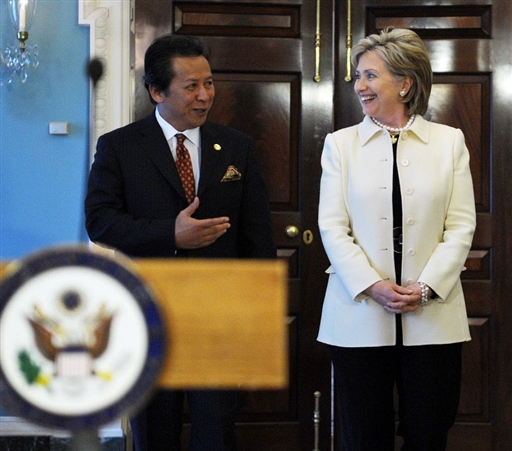This week Malaysia’s new foreign minister, Anifah Aman, made a short trip to the US capital as part of an effort to strengthen ties with the new Obama administration.
Anifah met with Secretary of State Hillary Clinton and Senator Richard Lugar, the ranking Republican senator in the Senate Foreign Relations Committee.
 The relatively unknown foreign minister showcased the talent that does exist within Umno. Speaking with candor and representing the openness that is true to his Sabahan roots, Anifah set in place a stronger framework for bilateral dialogue that is likely to increase Malaysia’s prominence in the Obama administration.
The relatively unknown foreign minister showcased the talent that does exist within Umno. Speaking with candor and representing the openness that is true to his Sabahan roots, Anifah set in place a stronger framework for bilateral dialogue that is likely to increase Malaysia’s prominence in the Obama administration.
This meeting is part of Najib Abdul Razak administration’s new approach in foreign policy, which puts a primacy on core bilateral relationships. Najib’s foreign policy approach stands in contrast to Dr Mahathir Mahathir’s overreach and Abdullah Ahmad Badawi’s central focus on the Islamic world.
The main driver shaping Malaysia’s bilateral ties is the economy, as shared values have taken on less prominence. Security relationships have moved away from discussions of terrorism to the issues of economic vulnerability and threats to economic viability such as piracy.
The dialogue in Washington reflected these new priorities. In Clinton’s visit to Asia in February, the Obama administration made it clear that their main focus would be addressing the economic downturn resulting from the financial crisis that has its roots in Wall Street.
Anifah spoke directly to these issues, highlighting a willingness to share lessons from the 1997 Asian financial crisis. Beneath the pleasantries of sharing economic knowledge lies genuine concern about the future of Malaysia’s economy. The US remains Malaysia’s largest trading partner and is the largest investor in the country.
Through manufacturing and services, US investment generates the most jobs of all the foreign investors in Malaysia. Since last year, the number of jobs has been shrinking, as closures and downsizing of firms, especially in electronics, has hit Malaysia hard, especially in Penang.
While Malaysia has diversified its markets and has the buffer of commodity (oil, gas and palm oil) wealth, the tie between US investment and Malaysian economic growth and employment remains strong.
Fall from 10th to 16th largest trading partner
However, the economic relationship in raw terms of amounts of investment and trade has fallen, as Malaysia has moved from the 10th largest trading partner of the US to 16th with exports and investments dropping precipitously over the last year.
It is in this vein that the Najib administration has called for the rejuvenating the free trade talks, which floundered during Abdullah’s tenure. While serious issues over services, fairness and process remain (and one should ask whether this agreement is in Malaysia’s interest at all as others have on Malaysiakini), Najib’s administration has set a different tone.
It is likely that Malaysia’s window to reach a trade agreement has passed as the climate in Washington has cooled toward trade liberalisation under a Democratic Congress, but the message of forging closer economic ties in this period of economic uncertainty has taken center stage.
Even the security relationship has also taken on an economic dimension. Events off the coast of Somalia have brought piracy higher on the US priority list. Malaysia has quietly reduced pirate attacks in the Straits of Malacca, working with Indonesia and Singapore.
While the numbers have increased lately, the overall reduction in the last five years is impressive. In the last year, Malaysia has worked on this issue globally through training initiatives, notably in the trouble spot off Somalia. The meeting in Washington has led to Malaysia being included in the key strategic body addressing piracy, the Contact Group, and represents the recognition of Malaysia’s expertise in this area.
Thorns remain in bilateral ties
It would be a mistake to suggest however that bilateral differences have erased (nor should they). Serious differences over Palestine, Iraq, Afghanistan and Iran remain.
Questions about the inclusion of minorities and respect for religious rights continue to overshadow the bilateral relationship. Malaysia’s treatment of migrants received special focus due to the US Senate’s March report on the abuse of Burmese migrants and documented Malaysian government involvement in human trafficking.
Concerns about the respect for the rule of law and political motivations of arrests also underscore real differences in outlooks. The sad fact, however, is that the Obama administration has shown limited credibility on human rights. The embargo on the torture pictures and the failure to put human rights on Clinton’s agenda in her first trip to Asia has left an imprint.
The Obama administration is struggling to shape its Southeast Asia policy, having come into office without a clear regional agenda and has yet to adequately embrace a clear set of regional priorities. It has focused on Indonesia in a push for a “strategic partnership” with the largest Muslim democracy, to the exclusion of other countries.
For its part, Anifah’s recent visit has served Malaysia well by putting Malaysia on the map during the pivotal period of policy reviews in Washington.
DR BRIDGET WELSH is associate professor in Southeast Asian studies at John Hopkins University-SAIS, Washington DC.

